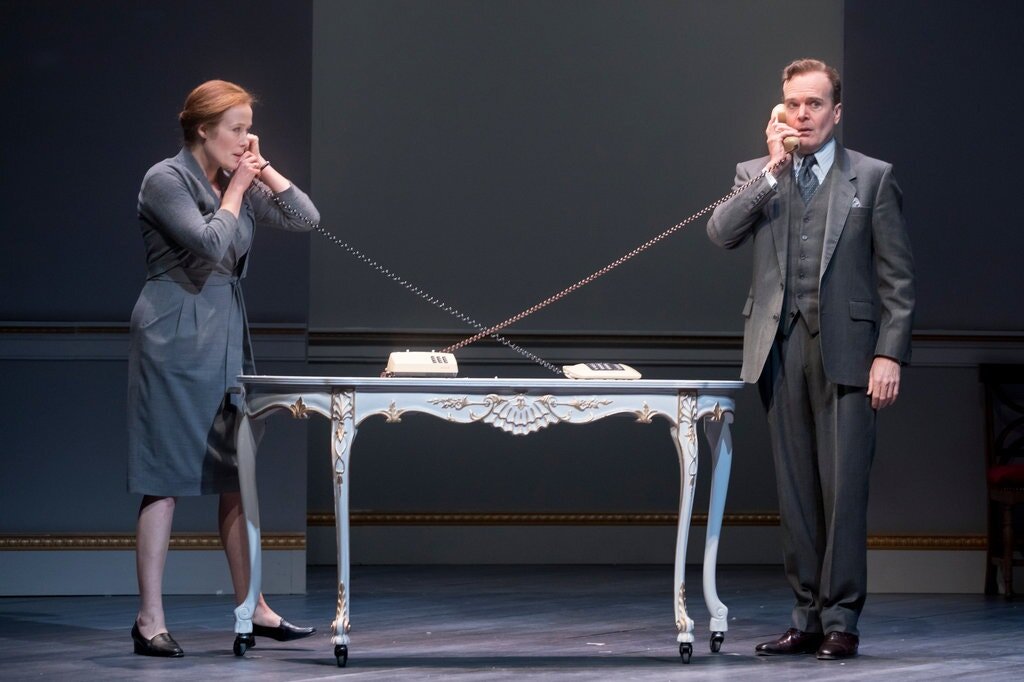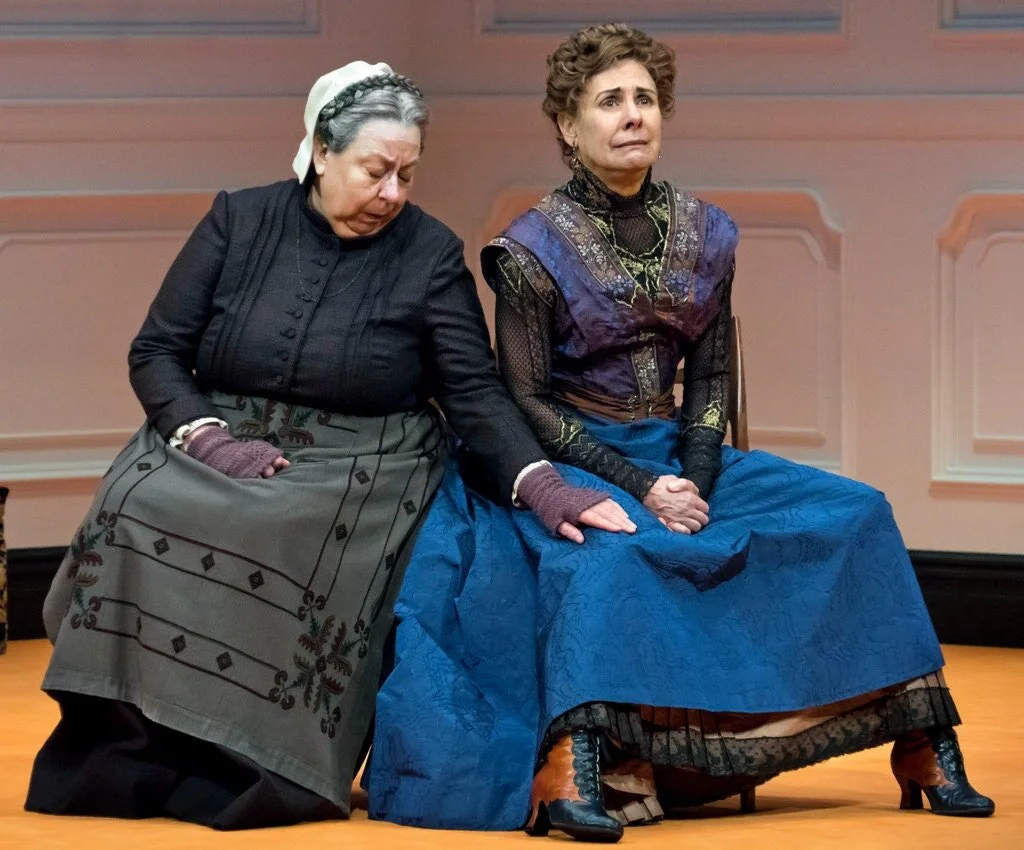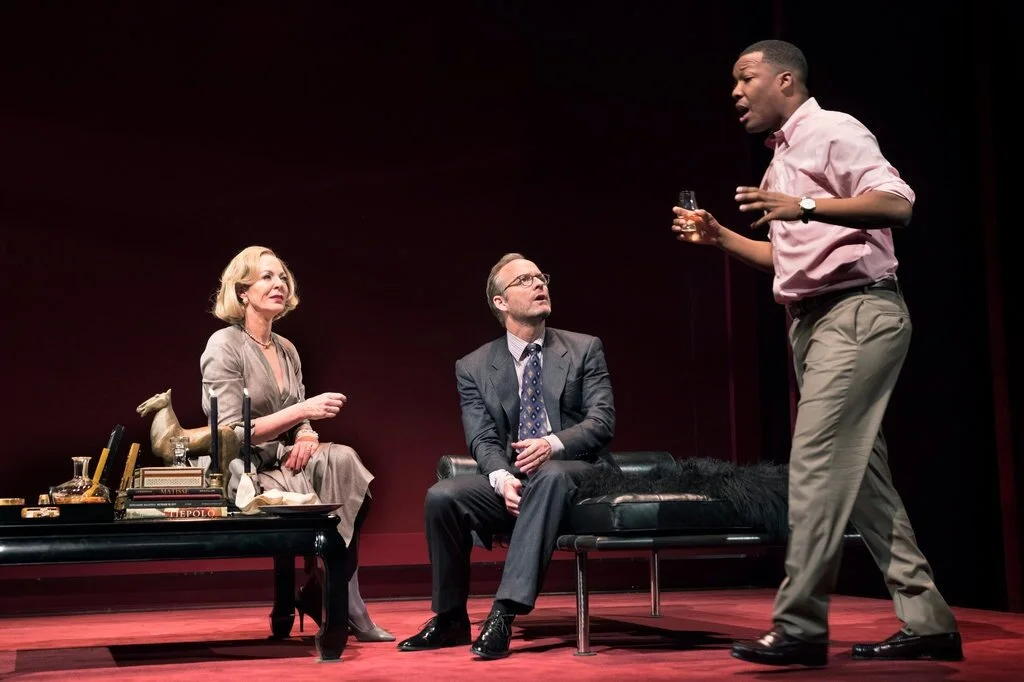For the men writing and directing female roles on Broadway, an exercise in empathy
Originally published on Broadway News
View this story online
A pivotal moment pauses a boisterous cocktail hour in the second act of Oslo, the new Tony-nominated play chronicling behind-the-scenes moments in international diplomacy. The unusual scene occurs when a group of men from both Israel and the Palestine Liberation Organization fall silent to salute the one woman in the room. As they raise their glasses, they say, “To Mona. Without her, we are nothing.”
This line in J.T. Rogers’ script is momentous for the narrative onstage and off: it depicts a female character being saluted by male characters who would traditionally consider her a second-class citizen, while simultaneously acknowledging this middle-aged woman as the driving force of a critically acclaimed and commercially successful Broadway play.
Representation of middle-aged women has become less scarce during the 2016-17 Broadway season, which has shone the spotlight on many women in their 30s, 40s and 50s. Along with Oslo, audiences have seen Nora Helmer return to her home in A Doll’s House, Part 2, Ouisa Kittredge adjust to disruption of her comfortably privileged life in Six Degrees of Separation, and Amanda Wingfield struggle to find a gentleman caller for her shy daughter in The Glass Menagerie.
In addition to their female protagonists, these shows share another commonality: they are written and directed by men. And recent seasons have also included impressive female roles — some of 2015-16’s offerings included The Father, The Humans and Our Mother’s Brief Affair, among others — also written by male playwrights.
The writing of the plays of the 2016-17 season was not entirely male-dominated, of course: Lynn Nottage and Paula Vogel made their Broadway debuts with Sweat and Indecent, respectively, both of which received Tony nominations for Best Play.
But for this season’s male scribes, when it came to writing strong female roles, they often viewed their work as exercises in empathy.
Empathy was certainly Lucas Hnath’s intention. The playwright is making his Broadway debut with the Tony-nominated A Doll’s House, Part 2, a sequel to Henrik Ibsen’s controversial play that depicts a woman leaving her husband and children to make her own way in the world. Ibsen’s original conclusion was so shocking that a different ending, which depicted Nora seemingly choosing to remain with her children, was written. Starring the 62-year-old actress Laurie Metcalf, Hnath’s play shows Nora returning to her former home to confront her husband about a divorce. A successful author, she is proudly independent and extremely opposed to the social construct of marriage.
In what Hnath refers to as the play’s “Marriage Sermon,” she proclaims:
“When people marry, they say, ‘I choose you, and I choose you forever,’ but who is this ‘you’ that they’re choosing? Because people change, over time people change into different people, so how can you say that ‘I want to be with this person’ when ‘this person’ is not going to be ‘this person’ 3 or 5 or 10 years from now, but there you are committed, forever til death stuck, stuck either with a person you don’t want to be with or with a person pretending to be a person they no longer are. I mean, I’d even go so far as to say that marriage makes a person change for the worse.”
To his surprise, when Hnath spoke to his peers about writing a sequel to Ibsen’s play and asked them what could have happened to Nora, the responses were universally surprising — and extremely negative.
“Everyone told me the worst stories,” he recalled. “She’s a prostitute, she worked in a factory, she did this, she did that. Based on a loose historical understanding. I always had this weird, sneaking suspicion that people wanted her to suffer. I don’t know if I’m right about that. I have this sneaking feeling that there is this expectation, ‘Of course she would be punished.’ An example of me deciding to go counterintuitive is to decide, ‘She’s going to come back and she’s doing great.’”
Punishment is doled out in Hnath’s script, but it is to the main character of Nora’s autobiographical work of fiction. As she tells her former housekeeper, played by Jayne Houdyshell, “…The woman, in the book, my heroine who says all the things I just said to you — had to kill her off — the book wouldn’t have been published if she didn’t die of consumption at the end of it. Oh, I wish I didn’t have to do that, but I figured it’s more important that people hear her ideas than not at all.”
When writing Nora, Hnath poured over feminist works from the late 1800s, including those by Charlotte Perkins Gilman, author of the influential feminist work “The Yellow Wallpaper,” as well as the Norwegian author Amalie Skram, an early proponent of the women’s movement whose works garnered renewed attention in the 1960s.
Conscious of the fact he was writing about a woman who defied social norms, Hnath said he was frequently aware of what he referred to as “blind spots” regarding women and the issues the play addressed while writing the piece.
“I wanted to write a sequel to A Doll’s House. And I wanted to think about marriage. I wanted to think about divorce. I wanted to think about coupling. In order to think about all that, you have to think about the reason that Nora left,” he said. “Nora left for reasons that are deeply gendered and pertain to double standards. You can’t write a play about Nora’s marriage and not reckon with that. It meant that being aware meant I approached it with tremendous caution and many, many, many questions.”
Hnath not only dove into academia, he also turned to Sarah Lunnie, a dramaturg and his longtime collaborator who often provided a female perspective for himself and the play’s director, Tony-nominated Sam Gold, who also helmed a revival of Tennessee Williams’ The Glass Menagerie, starring Sally Field, who also received a nomination for her performance.
Despite the progressive discussions that pack his script, the fact that the production was written and directed by men was not lost on Hnath, who said his favorite playwrights are women and referred to Suzan Lori-Parks and Caryl Churchill as his “gods.” He also turned to the actresses — Metcalf, Houdyshell and Condola Rashad, all of whom received Tony nominations for their performances — for feedback.
Describing himself and Gold as frequently questioning their standards and looking for differing perspectives, he said, “We had three extraordinary actresses who really contributed a lot to the development of the play as well. We really wanted their thoughts. They’re in it. They’re doing it. They’ll tell us what’s honest and what’s dishonest.”
Listening to differing points of view is exactly what Mona attempts to facilitate in Oslo, subtly and silently encouraging conversation between lifelong opponents who have centuries of anger behind them. She works with her husband, Terje Rød-Larsen, to sequester representatives of the two groups in an isolated home and change the course of history.
Played by Jennifer Ehle, Mona is based on the real-life Mona Juul, an accomplished official in the Norwegian Foreign Ministry. But she is also a woman, which places her in low ranking in the view of both Israelis and Palestinians and establishes her earning of their respect even more remarkable.
“She is the lead and slowly realized in the play, the actual engine of the play,” Rogers said. “[She has] a slight element of mystery which would make the Israeli and Palestinian characters think, ‘Who is this woman? I’m so impressed, I want to please her. Impress her.’
“It fascinated me to have a play where, if I wrote it, the rather larger-than-life Israeli and Palestinian lead characters are coming from a worldview where the women are always second tier, second class,” the playwright added. “And here they are, faced with and eventually collaborating with a woman. First of all, they have to give her her due because she’s the highest-ranking Norwegian they meet and thus she has power by position. And then she has power because she’s so good.”
Throughout Rogers’ three-hour drama, directed by Tony nominee Bartlett Sher, audiences see Mona plot and execute meetings, calm agitated nerves, smooth egos and, at one point, threaten her more impulsive husband with divorce if he attempts to interfere with a conversation. Her steely reserve is more clearly established when a pair of German tourists enter the secret location and she promptly dismisses them before giving the Israeli and PLO representatives what Rogers described as the Henry V St. Crispin Day speech, bluntly stating that no one would solve their problem and ordering them to save themselves. Rogers, who described Mona as “a lot more admirable and smarter than I am,” considers that scene the moment each of the men are both motivated and altered by Mona’s strength.
“Every time there’s a crisis in the play, you see her hand, deftly or directly involved in solving it,” Rogers said. “And they begin to realize this. As they toast her, with warmth but heartfelt meaning in the middle of the second act, ‘To Mona. Without her, we are nothing.’”
Witnessing a group of men honor a woman’s power may be a bittersweet scene for many, following Hillary Clinton’s loss in the 2016 presidential election. Oslo premiered Off-Broadway before Donald Trump’s victory, but while writing A Doll’s House, Part 2, which premiered in the spring of 2017, Hnath wrestled with reacting to the double standards permeating current events. After reading pieces on whether the public response to Hillary was rooted in misogyny, he rewrote dialogue and speeches of his own script to reflect current events — ones that felt undeniably relevant.
Describing the writing as “constantly evolving, constantly shifting, constantly responding to all sort of voices out in the world,” he said, “there was certainly a degree to which when the results of the election happened, I doubled down and said, ‘OK, let’s focus only on the story and try not to sort of bend the theme.’
”The themes of Six Degrees of Separation, John Guare’s portrait of a wealthy couple whose lives are changed by an encounter with a con artist, are undeniably relevant, according to director Trip Cullman, who helms the Tony-nominated first-ever Broadway revival, starring 57-year-old Allison Janney.
Directing women is nothing new to Cullman, who helmed the productions of Wild Animals You Should Know and I’m Gonna Pray for You So Hard and who first saw Six Degrees of Separation in New York at age 15. The play, he said, made an indelible impression on him; he recalled seeing it as “one of the most memorable experiences I had at the theater in my lifetime.” Helming the first-ever Broadway revival of the production, he recognizes the importance of Ouisa being back on Broadway, but he does not view the material in a gendered way.
“As an artist, in my approach to how I look at material, I don’t see it at all gendered,” he explained. “I don’t bring my own gender to bear as a kind of sole focus, as it were. Maybe I’m particular because most of my best friends are women, and in some ways, as a gay man, maybe I identify with women much more strongly, perhaps, than a straight white guy would. I’m not sure if any of that comes to bear. But I do know that my own approach to the material doesn’t feel like it has to be filtered through a lens of gender.”
Instead, he said, he strives to inspire compassion in a character, regardless of any defining aspects. “I think that sort of what we as theater artists do is – [while] a completely blanket over-generalization — I think the project is one of empathy. Whether the character is male or female, whether the color of the skin is black or white, whether they come from a privileged background or an impoverished background, our job is to imagine ourselves walking through the world in their shoes.”
A similar motivation was Hnath’s hope for A Doll’s House, Part 2; in fact, the playwright described the play as “a gymnasium from shifting your perspective to somebody else’s.”“I don’t know if that will change anybody in the long run but it’s good practice for the outside world,” he said. “I think it’s all baby steps. I am skeptical about massive adjustments in people’s minds, but I am hopeful for small shifts, small moments being slightly more aware, being able to sort of spot other kinds of moments of double standards or invisible prisons — bad rules, conventions that we’re kind of swooping into without realizing it.”
Examining and attempting to understand human nature is what drives Rogers, who said, “Rightly or wrongly I feel it’s my job to understand human beings… As an individual artist when you sit down and write none of that matters. You have to write the most complicated, confounding, interesting people. If I were to research women as women, as opposed to men, the only thing I could guarantee is my female characters would suck, because they would come out as ideology as opposed to human experience.”
And, Rogers said, middle-aged female characters offer more opportunities for richer, more complicated people. “It’s great to have plays about young, pretty people around, but not too many of them… Juliet is great but a little Juliet goes a long way.”
That desire also drives Cullman, who, when reflecting on gender parity both on and offstage regarding female playwrights and directors, said, “I want to see Leigh Silverman’s production of Glengarry Glen Ross. I want to see Anne Kaufman take on a Shakespeare play in the park. I feel strongly that where I see a kind of intense disparity and injustice. I think we’re at this sort of tipping point where there’s about to be a big sea change, wherein hopefully culturally we’re looking at the disparity of representation and doing something about it.”



